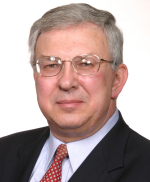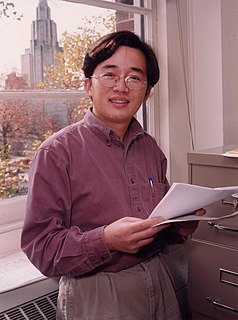Related Research Articles
Sajeev John, OC, FRSC is a Professor of Physics at the University of Toronto and Canada Research Chair holder.

The American Society of Civil Engineers (ASCE) is a tax-exempt professional body founded in 1852 to represent members of the civil engineering profession worldwide. Headquartered in Reston, Virginia, it is the oldest national engineering society in the United States. Its constitution was based on the older Boston Society of Civil Engineers from 1848.

Henry Petroski is an American engineer specializing in failure analysis. A professor both of civil engineering and history at Duke University, he is also a prolific author. Petroski has written over a dozen books – beginning with To Engineer is Human: The Role of Failure in Successful Design (1985) and including a number of titles detailing the industrial design history of common, everyday objects, such as pencils, paper clips, and silverware. His first book was made into the film When Engineering Fails. He is a frequent lecturer and a columnist for the magazines American Scientist and Prism.

The David and Lucile Packard Foundation is a private foundation that provides grants to not-for-profit organizations. It was created in 1964 by David Packard and his wife Lucile Salter Packard. Following David Packard's death in 1996, the Foundation became the beneficiary of part of his estate. The foundation's goals, through the use of grants, are to "improve the lives of children, enable creative pursuit of science, advance reproductive health, and conserve and restore earth’s natural systems." As of 2016, The David and Lucile Packard Foundation was the 20th wealthiest foundation in the United States.

Rafael Luis Bras is a Puerto Rican civil engineer best known for his contributions in soil-vegetation-atmosphere system modeling. He currently serves as the provost and executive vice president for Academic Affairs at the Georgia Institute of Technology, while maintaining faculty appointments in the School of Civil and Environmental Engineering and the School of Earth and Atmospheric Sciences.
William Richard Peltier, Ph.D., D.Sc. (hc), is University Professor of Physics at the University of Toronto. He is director of the Centre for Global Change Science, past principal investigator of the Polar Climate Stability Network, and the Scientific Director of Canada's largest supercomputer centre, SciNet. He is a fellow of the Royal Society of Canada, of the American Geophysical Union, of the American Meteorological Society, and of the Norwegian Academy of Science and Letters..
Daniel Amihud Lidar is the holder of the Viterbi Professorship of Engineering at the University of Southern California, where he is a Professor of Electrical Engineering, Chemistry, Physics & Astronomy. He is the Director and co-founder of the USC Center for Quantum Information Science & Technology (CQIST) as well as Scientific Director of the USC-Lockheed Martin Quantum Computation Center, notable for his research on control of quantum systems and quantum information processing.
Douglas Lamar Inman was a Professor of Oceanography at the Scripps Institution of Oceanography.

Constance J. Chang-Hasnain is a Taiwanese-born American electrical engineer, and the John R. Whinnery Chair Professor and associate dean for strategic alliances, College of Engineering, the University of California, Berkeley. She is also the current vice president of The Optical Society and will serve as president in 2021.
Dan Mircea Frangopol is an American civil engineer and the inaugural holder of the Fazlur R. Khan Endowed Chair of Structural Engineering and Architecture at Lehigh University, Bethlehem, Pennsylvania.

Yonggang Huang is the Walter P. Murphy Professor of Engineering at Northwestern University.
Ioannis George (Yannís) Kevrekidis is currently the Bloomberg Distinguished Professor in Chemical and Biomolecular Engineering within the Whiting School of Engineering, Johns Hopkins University. He holds secondary appointments in the Whiting School's Department of Applied Mathematics & Statistics and the Johns Hopkins University School of Medicine's Department of Urology.

Francisco Javier Valero-Cuevas is an engineer of Mexican origin, and a Professor of Biomedical Engineering, Biokinesiology and Physical Therapy, Aerospace and Mechanical Engineering, Computer Science, and Electrical Engineering at the University of Southern California. He is known for his work on how the human hand works, and its clinical applications. He is notable for several inventions, including devices for measuring hand function and leg function, and the construction of archways in civil engineering. Among his scholarly contributions is a textbook on the mathematical foundations underlying the study of motor control and biomechanics. He is an Elected Fellow of the American Institute for Medical and Biological Engineering (2014), an Elected Senior Member of the Institute of Electrical and Electronics Engineers, and a Thomas J. Watson Fellow.
Viswanathan Kumaran is an Indian chemical engineer, rheologist and a professor at the Department of Chemical Engineering of the Indian Institute of Science. He is known for his studies on stability of flow past flexible surfaces and is an elected fellow of the Indian Academy of Sciences, Indian National Science Academy and the Indian National Academy of Engineering. The Council of Scientific and Industrial Research, the apex agency of the Government of India for scientific research, awarded him the Shanti Swarup Bhatnagar Prize for Science and Technology, one of the highest Indian science awards for his contributions to Engineering Sciences in 2000. A recipient of the TWAS Prize in 2014 and the Infosys Prize 2016 in the Engineering and Computer Science category, Kumaran was listed in the Asian Scientist 100, a list of top 100 scientists from Asia, by the Asian Scientist magazine.
Alexandria Boehm is an American scientist whose field of study is civil and environmental engineering. She researches water quality of ocean coastal zones in tandem with finding the best solutions to prevent and clean up these polluted waters. Boehm is a Senior Fellow at Stanford University's Woods Institute for the Environment and an Associate Professor in Stanford University's Department of Civil and Environmental Engineering.
Nicole Metje PhD, MCInstCES, MASCE, FHEA is Professor of Infrastructure Monitoring, Head of the Power and Infrastructure Research Group, and Deputy Director for Sensors of the UKCRIC National Buried Infrastructure Facility at the University of Birmingham. She plays a significant role in the development and application of sensors for buried infrastructure assessment and monitoring.
Earl Randall Parker was an American engineer and professor. Parker began his metallurgy career in the mid 1930s as a researcher for the General Electric Research Laboratory. In the mid 1940s, Parker began teaching metallurgy at the University of California, Berkeley and remained in his teaching position until 1978. While at Berkeley, Parker was a chair of the material sciences department and director of the school of engineering research between the 1950s and 1960s. For awards, Parker received a Guggenheim Fellowship in 1960 and was named a National Medal of Science recipient in 1979.